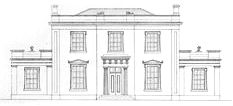Age
Mrs. Jennings says she is “of age” when she gets engaged to Willoughby, which likely means at least 25.
Family and Situation
Though we learn little of Miss Grey’s family, we know that she is living with guardians named Mr. and Mrs. Ellison, suggesting that her parents may well be deceased or are otherwise out of the picture. Mrs. Jennings hears gossip that Miss Grey and Mrs. Ellison do not get along and that the Ellisons are likely happy to see her married off.
We do know that Miss Grey had an aunt whom Mrs. Jennings knew “very well” and calls “Biddy Henshawe.”
We know that Miss Grey has a dowry of £50,000, which would be very large for the time. Mrs. Jennings says that “the family are all rich together,” so there may be additionally good connections.
Connections
Miss Gray Is “particular friends” with someone who knows Mrs. Taylor. This common acquaintance has the whole story about the Willoughby engagement.
Miss Grey made the acquaintance of Mr. Willoughby prior to his sojourn in Devonshire; he even says that “I had reason to believe myself secure of my present wife, if I chose to address her, and I persuaded myself to think that nothing else in common prudence remained for me to do.”
Appearance
When seen across the room by Elinor and Marianne, the narrator describes Miss Grey as a “very fashionable looking young woman.” Mrs. Jennings later conveys that the consensus is that she is “a smart, stylish girl...but not handsome.”
Character
When Elinor asks if Miss Grey is reputed to be amiable, Mrs. Jennings says "I never heard any harm of her; indeed I hardly ever heard her mentioned,” suggesting, when coupled with her older age and enormous dowry, that she is not likely to be very outgoing or engaging.
On the other hand, Willoughby characterizes her as “jealous as the devil.” He later explains that she discovered the correspondence with Marianne by playfully reading his letters and then taking the revelation with “wretchedness,” “passion” and “malice.” He then insists that the cold letter he send to cut ties with Marianne was dictated by Sophia. Of course, we know Willoughby has warped the truth in other contexts, so this may just be an excuse for acting poorly.
Mrs. Smith evaluates her to be “a woman of character,” thus ensuring her forgiveness of Willoughby. Willoughby insists to Elinor that “She does not deserve your compassion.—She knew I had no regard for her when we married.—Well, married we were, and came down to Combe Magna to be happy, and afterwards returned to town to be gay.” The narrator does tell us that Willoughby eventually finds some measure of “domestic felicity,” so she must be able to overlook his faults and find a comfortable equilibrium.
